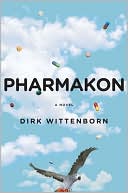

 |

|

The average rating for Pharmakon, or the Story of a Happy Family based on 2 reviews is 4 stars.
Review # 1 was written on 2009-09-11 00:00:00 William Austin William AustinThis book was divided into four parts, and it basically felt like two different novels to me: part one, and parts two through four. I really liked part one, but part two slowly went downhill and by the time I reached part four, I had mostly lost interest. I'm giving it three stars overall, though, because the writing was good and I liked the premise. Part I of Pharmakon was the story of Will Friedrich, a 1950s psychologist who thinks he may have stumbled on a powerful antidepressant. Partnering with psychiatrist Bunny Winton, he tests the substance and finds it dramatically effective in reducing depression and improving functioning -- until one of his research subjects, Casper, has a psychotic break and goes on a murder rampage. That day, Friedrich's youngest son dies under mysterious circumstances and the family subsequently lives in the shadow of his death and the possibility that Casper was the killer, and that he may return to do more damage. Part I is fast-paced and interesting, exploring complex relationship dynamics as well as those of a psychologist who is by no means immune to personality difficulties of his own. Part II was where the story started to slowly fall apart for me. Narrated by Zach, the child born to the Friedrichs after their son's death, it read less like a novel and more like a standard dysfunctional-family-and-drug-abuse memoir, a possible prequel to "A Million Little Pieces" but less interesting, perhaps because it was a memoir-pretending-to-be-a-novel as opposed to a novel-pretending-to-be-a-memoir. It's the story of how Zach, who never manages to feel comfortable in his own skin, gradually becomes a serious substance abuser although he manages to snag a few surprising accomplishments along the way. Zach's decline appears to be connected to his father's excessively psychologically-minded childraising tactics as well as to the destructive events surrounding the family, but this is largely told to us rather than shown. There were many good things about the concept of this book -- its clever title ("pharmakon" means both "poison" and "cure") really says it all, as it explores the various ways in which we try, and fail, to capture happiness (legal drugs, illegal drugs, psychotherapy, achievement, upward mobility, finding just the right suburban house, trying and failing to fit in socially, etc.). As the title suggests, our misguided attempts at seeking happiness often prove to be our undoing -- at least, that's what happens to many of the characters. It's an interesting idea to explore. Had Wittenborn extended part one and tightened, or even eliminated, parts two through four, it would have come closer to reaching its potential. |
Review # 2 was written on 2008-08-25 00:00:00 Andy Banderas Andy BanderasA rich story of parents and children, and the question of why things happen as they do - the characters intertwined inextricably with man's apparently relentless quest to fix ourselves with chemicals. William Friedrich's family is relentlessly stalked by the not-so-friendly ghost of Casper, a psychotic young man that took part in a pharmaceutical study developed and conducted by Friedrich in the early 1950s, who subsequently kills Friedrich's study partner and whose presence continue to haunt the family in the following decades. Choices, even well-intentioned ones, reverberate for years. William's life will forever be changed, and his family affected for years, by the choice he makes to develop and test the world's latest-and-greatest feel-good drug; his wife, Nora, makes the choice to dissuade a young Casper from his early plans for suicide, thus involving him in her husband's research. Throughout the story we are reminded again and again of the many facets of life affected through the double-edged sword of pharmaceuticals - legal or illegal. Chemical combinations that at one time seemed to smooth over mental and emotional disorders (perhaps facilitating an end to so many of the brutish methods once used on the mentally ill); coke, speed, and other drugs appeared to enhance endurance and produce ecstacy in the user; Dristan, Contac, Ritalin and others relieve characters' physical symptoms of living in a world that they often seem ill-equipped to handle. All of this set against the whirlwind background of time itself, America in the early 1950s to the 80s, and told through changing viewpoints and narration. There are many stories being told in this book, many reasons, many actions and the oh-so-far reaching consequences; much more than one simple summary can give. |
CAN'T FIND WHAT YOU'RE LOOKING FOR? CLICK HERE!!!